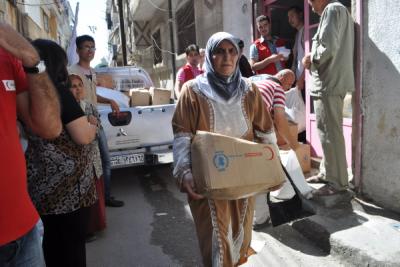WFP: Urgent funding needed in Syria
Teddy Wolstenholme
|
17 March 2013

ROME-- The United Nations World Food Programme warned this week that severe funding shortages are leading to a huge food deficit for a significant proportion of the Syrian population at risk of starvation.
Two years since the crisis in Syria began, lack of funding has reached a critical level. The WFP has been reliant on generous donations from countries all over the world including Australia, Canada, Japan, the United States, the European Union and the United Kingdom, but the continuing unrest is putting immense pressure on their funding.
WFP Executive Director Ertharin Cousin explained “This is a global crisis that requires a global response so that we can meet the growing and urgent needs of Syrians”. The WFP’s aid attempts are being strongly hindered by a lack of resources and this threatens not only the 2.5 million people in Syria but also over a million refugees in neighbouring countries.
The WFP has distributed over 83,000 metric tonnes of food to desperate Syrians since the crisis began in 2011. Their work goes beyond Syria too; over a million food vouchers and over half a million food parcels have been sent out to vulnerable refugees in neighbouring countries, including Iraq, Jordan, Lebanon, Turkey and Egypt.
However, the WFP has reached breaking point and the emergency operation to feed these conflict-affected people desperately needs 156 million USD of funding in order to continue their work until at least June.
As WFP is funded entirely by voluntary contributions, it is calling upon donors to come forward and help alleviate the food shortages in these crisis-ridden countries.
At the moment, the WFP is unable to raise enough funding to follow through with their ambition to increase the food ration to be delivered to Syrian families for the month of March. Due to severe bread shortages across the country and a decline in the availability of local produce in the markets, Syrians are requiring greater rations.
A failure to raise appropriate funding will lead to a reduction in the food basket that Syrians are currently offered, and a decline in the number of people who are able to receive the aid. These effects could come into place as early as mid-April.
“This is a critical time for Syrians. They have exhausted their savings and they need more help as this crisis goes into its third year, so now is not the time to reduce or stop our operations,” added Cousin. “We are determined to continue our life-saving assistance but we need on-going support from generous donors -- and the support of new donors -- until a political solution is in place.”



